FOTA Management Plugin by Mender
Firmware Over-the-Air Management
Description
Continuously roll out new firmware to ensure compliance with security regulations like the EU Cyber Resilience Act while improving your customer experience with stability enhancements and new innovative features. Mender is the market-leading FOTA Management solution, providing secure and robust over-the-air (OTA) software updates for your entire device fleet.
Security by design: Ensure communication, data integrity, and authenticity are verified. Trust a battle-tested solution with millions of devices under management.
Robustness: Minimize the risk of bricking devices, even in cases of losing power or connectivity in the middle of the update process. Devices will always be in a known and operable state
Optimize: Meet bandwidth and uptime requirements and realize up to a 90% reduction in bandwidth consumption with delta updates. Advanced scheduling and phased rollout to minimize risk of fleet interruption.
Pricing
1NCE Plugins allow you to start at no cost. Firmware Over-The-Air Management plugin by Mender comes with a free trial plan for up to 10 devices for 12 months. You can increase the number of devices and unlock more features and benefits by selecting the right plan for your business. For further inquiries about usage and pricing, please reach out to [email protected].
Start Using
To start using the 1NCE OS Plugin with Mender you first need to create a hosted Mender account and get an Organization token on the Mender side. Starting from the main page of Mender, choose My organization under the dropdown on your profile. Keep the Organization token because it is necessary for creating the plugin in the 1NCE OS system.
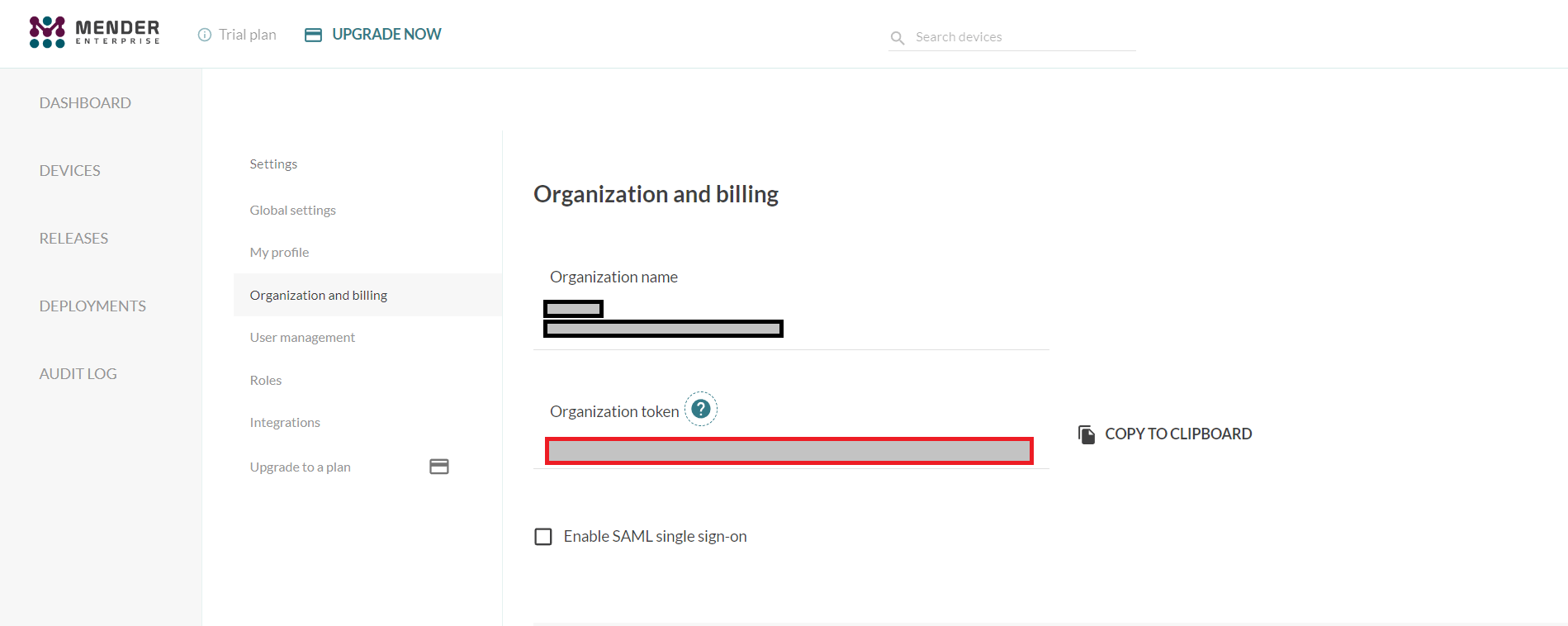
Organization Token in Mender
To finish the configuration in 1NCE OS you can choose one of the two options described below. After configuration is done you can use the Demo script for zephyr from 1NCE OS to showcase Mender Plugin features and understand the capabilities of 1NCE OS SDK & FOTA client.
⚠️ Please note that by installing this plugin, you are aware that data is shared with Mender.
Mender Plugin Installation via Frontend
Plugin Installation
Plugin can be installed in 1NCE OS portal "Plugins" tab by choosing "Mender".
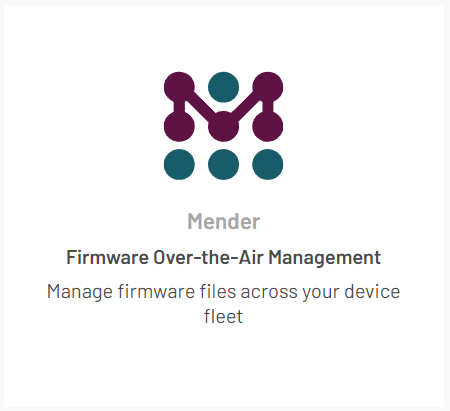
Mender Plugin
To install a Mender Plugin you should provide the Organization Token from Mender.
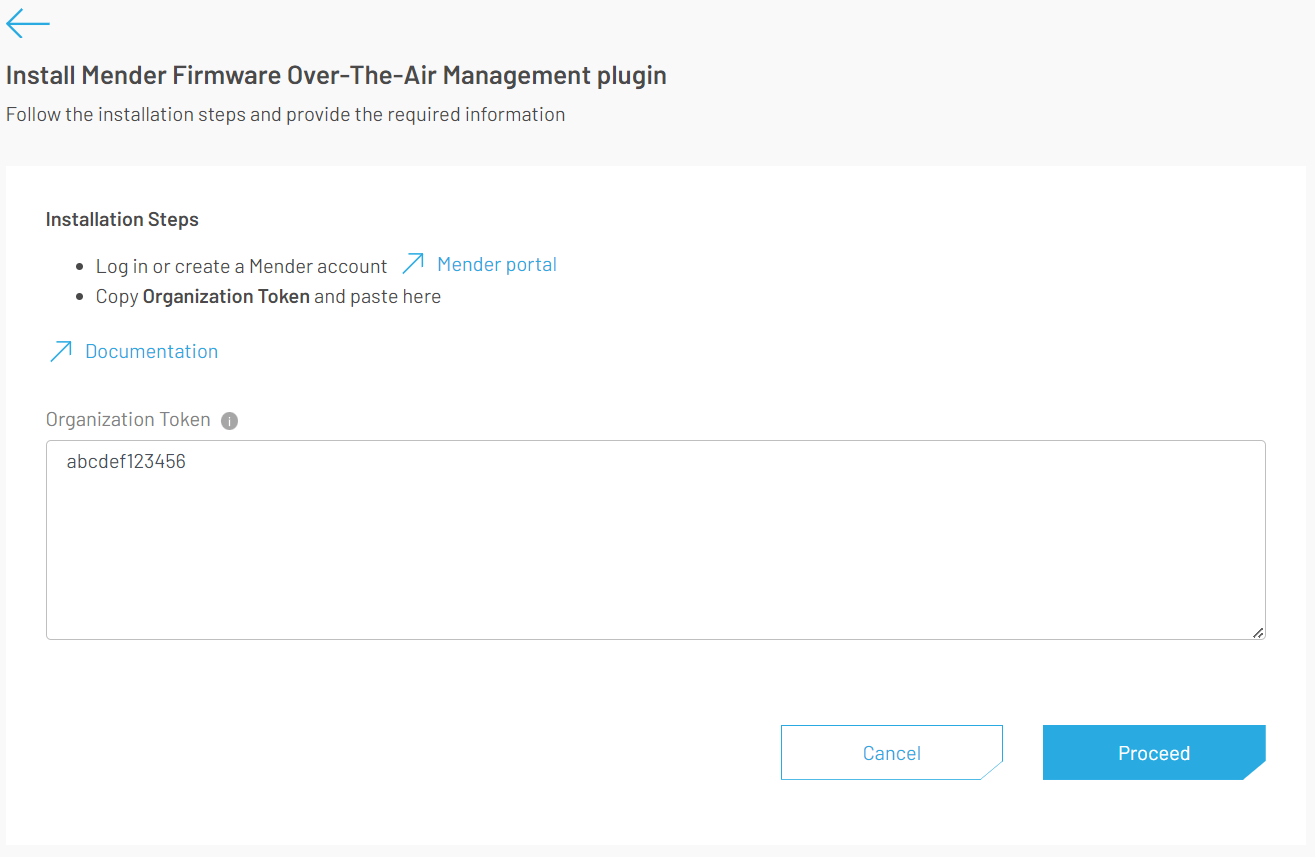
Mender plugin installation
Mender plugin installation via API
Plugin Installation
The Mender plugin can be created via the partners API by using the "MENDER" partner in the API Explorer.
Only the Organization token from the Mender is mandatory to be added to the request body.
Example:
curl --location --request POST 'https://api.1nce.com/management-api/v1/partners/MENDER/plugins' \
--header 'Authorization: Bearer <TOKEN>' \
--header 'Content-Type: application/json' \
--data-raw '{
"tenantToken": "abcdef123456"
}'If a specific user-generated Private Key and Public Key requires to be added it can be done only via API.
curl --location --request POST 'https://api.1nce.com/management-api/v1/partners/MENDER/plugins' \
--header 'Authorization: Bearer <TOKEN>' \
--header 'Content-Type: application/json' \
--data-raw '{
"tenantToken": "abcdef123456",
"publicKey": "-----BEGIN PUBLIC KEY-----\n .. \n-----END PUBLIC KEY-----\n",
"privateKey": "-----BEGIN PRIVATE KEY-----\n .. \n-----END PRIVATE KEY-----\n"
}'Integration Get or Uninstall endpoints
To get details or uninstall your Mender integration via API, you can use the same endpoints you would use for a generic Plugin described in the API Explorer.
Utilizing Mender plugin
The Mender server stores and controls the deployment of software updates over the air to your devices. Mender can be used to manage devices, upload and manage software releases to the server, and create deployments to roll out software to your devices.
1NCE OS mender plugin supports CoAP/CoAPs to HTTPS proxying with seamless support for Authorization. The HTTPs Mender endpoints should be added in CoAP Requests Proxy-URI options. To utilize proxy functionality please use one of the following endpoints for CoAP requests:
coap://coap.proxy.os.1nce.com:5683/mendercoaps://coaps.proxy.os.1nce.com:5684/mender.
If CoAPs is required to be used please refer toDTLS encryption for CoAP.
Coap to HTTPS Proxy functionality
CoAP to HTTPS proxy's main functionality is to "translate" the CoAP requests to HTTPS requests and HTTPS responses to CoAP responses. Mender Plugin provides additional logic for Mender auth endpoint and ensures Authorization header injection for other Mender endpoints.
- Whenever Mender auth endpoint is used for POST requests, 1NCE OS will generate the correct request body required for authentication and store the returned JWT token in the system for future use. Please note that renewing the JWT token requires calling the endpoint once again. Post request body example:
{ "id_data": "{\"iccid\":\"1234567890123456789\"}", "pubKey": "-----BEGIN PUBLIC KEY-----\n .. \n-----END PUBLIC KEY-----\n", "tenant_token": "abcdef123456=" } - For any other request where Mender endpoints are being used in Proxy-URI options, the JWT token will be added as an additional Authorization header for HTTPS request.
{ "Authorization": "Bearer 'JWT_TOKEN'" } - If Mender auth endpoint was never called and JWT token is not present in 1NCE OS, then the request will be proxied without the Authorization header.
Adding devices in Mender
By proxying the POST request to Mender auth endpoint device would show up in mender as "Pending". The device needs to be accepted by selecting "Accept device".
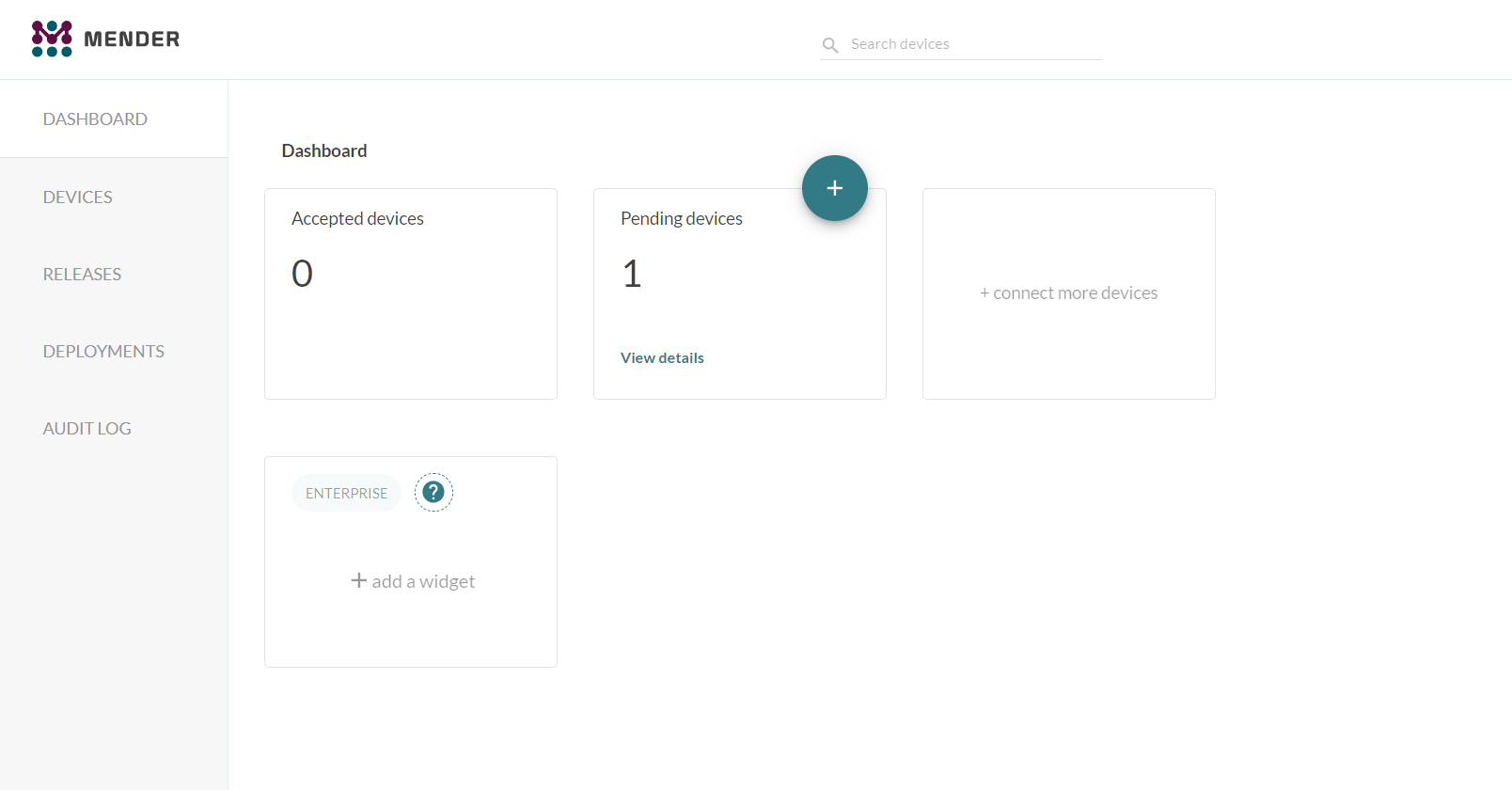
Pending Device in Mender
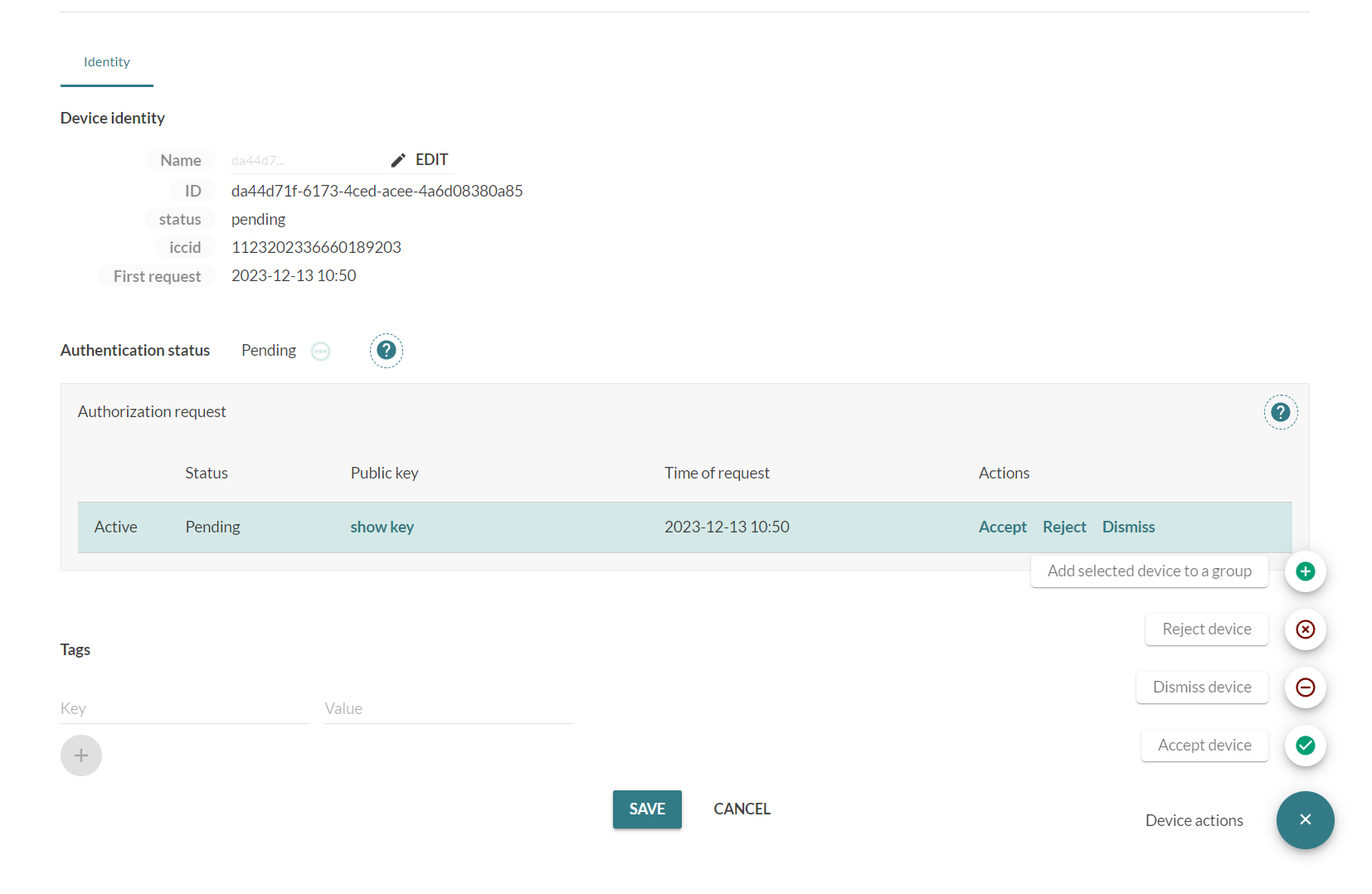
Accepting Device in Mender
Release, Deployment creation
To use the 1NCE OS Plugin for Release and deployment management in Mender, please refer to Demo script for zephyr from 1NCE OS. Examples of Artifact creation, Release, and Deployment management are provided.
Features and Limitations
General Plugins features and limitations applies to Mender. There are still some individual Limitations applied for Mender:
Limitations
- Only mender endpoints are allowed to be proxied. The following endpoints in CoAP Request Proxy-URI options are allowed for Mender Plugin:
hosted.mender.io
eu.hosted.mender.io - Public key and Private key can be provided only via API. Keys should be a pair and they should be provided in
PEMformat. The public key max allowed string length is 1000 chars, Private key max allowed string length is 3000 chars. - Currently only
RSA PKCS1andRSA PKCS8private and public key types are supported. Other typesECDSAandED25519are not supported for now.
Outcome of successful configuration
Device List
If the configuration is completed devices should be accepted and available on the Mender devices list.

Device fleet in Datacake
Deployment status
In the case of an active deployment, it should be possible to track deployment statuses such as 'downloading,' 'installing,' 'success,' and other relevant statuses.

Deployment with status 'installing'
In device deployment history it should be available to see all deployments.

Device deployment history
Updated 4 months ago